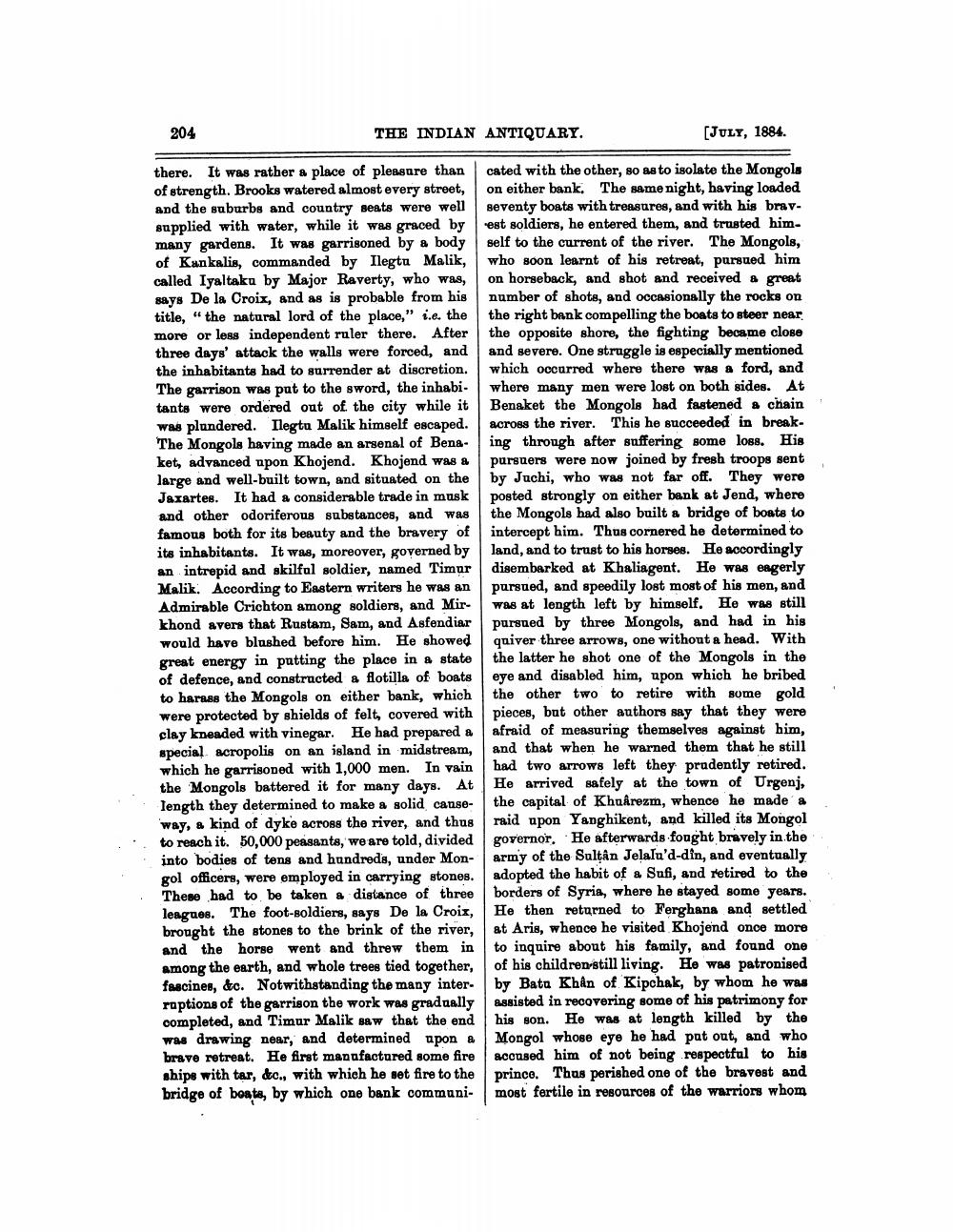________________
204
there. It was rather a place of pleasure than of strength. Brooks watered almost every street, and the suburbs and country seats were well supplied with water, while it was graced by many gardens. It was garrisoned by a body of Kankalis, commanded by Ilegtu Malik, called Iyaltaku by Major Raverty, who was, says De la Croix, and as is probable from his title, "the natural lord of the place," i.e. the more or less independent ruler there. After three days' attack the walls were forced, and the inhabitants had to surrender at discretion. The garrison was put to the sword, the inhabitants were ordered out of the city while it was plundered. Ilegtu Malik himself escaped. The Mongols having made an arsenal of Benaket, advanced upon Khojend. Khojend was a large and well-built town, and situated on the Jaxartes. It had a considerable trade in musk and other odoriferous substances, and was famous both for its beauty and the bravery of its inhabitants. It was, moreover, governed by an intrepid and skilful soldier, named Timur Malik. According to Eastern writers he was an Admirable Crichton among soldiers, and Mirkhond avers that Rustam, Sam, and Asfendiar would have blushed before him. He showed great energy in putting the place in a state of defence, and constructed a flotilla of boats to harass the Mongols on either bank, which were protected by shields of felt, covered with clay kneaded with vinegar. He had prepared a special acropolis on an island in midstream, which he garrisoned with 1,000 men. In vain the Mongols battered it for many days. At length they determined to make a solid causeway, a kind of dyke across the river, and thus to reach it. 50,000 peasants, we are told, divided into bodies of tens and hundreds, under Mongol officers, were employed in carrying stones. These had to be taken a distance of three leagues. The foot-soldiers, says De la Croix, brought the stones to the brink of the river, and the horse went and threw them in among the earth, and whole trees tied together, fascines, &c. Notwithstanding the many interruptions of the garrison the work was gradually completed, and Timur Malik saw that the end was drawing near, and determined upon a brave retreat. He first manufactured some fire ships with tar, &c., with which he set fire to the bridge of boats, by which one bank communi
THE INDIAN ANTIQUARY.
[JULY, 1884.
cated with the other, so as to isolate the Mongols on either bank. The same night, having loaded seventy boats with treasures, and with his bravest soldiers, he entered them, and trusted himself to the current of the river. The Mongols, who soon learnt of his retreat, pursued him on horseback, and shot and received a great number of shots, and occasionally the rocks on the right bank compelling the boats to steer near the opposite shore, the fighting became close and severe. One struggle is especially mentioned which occurred where there was a ford, and where many men were lost on both sides. At Benaket the Mongols had fastened a chain across the river. This he succeeded in breaking through after suffering some loss. His pursuers were now joined by fresh troops sent by Juchi, who was not far off. They were posted strongly on either bank at Jend, where the Mongols had also built a bridge of boats to intercept him. Thus cornered he determined to land, and to trust to his horses. He accordingly disembarked at Khaliagent. He was eagerly pursued, and speedily lost most of his men, and was at length left by himself. He was still pursued by three Mongols, and had in his quiver three arrows, one without a head. With the latter he shot one of the Mongols in the eye and disabled him, upon which he bribed the other two to retire with some gold pieces, but other authors say that they were afraid of measuring themselves against him, and that when he warned them that he still had two arrows left they prudently retired. He arrived safely at the town of Urgenj, the capital of Khuârezm, whence he made a raid upon Yanghikent, and killed its Mongol governor. He afterwards fought bravely in the army of the Sultan Jelalu'd-din, and eventually adopted the habit of a Sufi, and retired to the borders of Syria, where he stayed some years. He then returned to Ferghana and settled at Aris, whence he visited Khojend once more to inquire about his family, and found one of his children-still living. He was patronised by Batu Khân of Kipchak, by whom he was assisted in recovering some of his patrimony for his son. He was at length killed by the Mongol whose eye he had put out, and who accused him of not being respectful to his prince. Thus perished one of the bravest and most fertile in resources of the warriors whom




